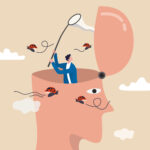
Sahar Seidl summarises a qualitative study on the ontological insecurity of inattentiveness, which looks at how risk management processes in acute psychiatric care can have a negative impact on patient recovery.
[read the full story...]
Sahar Seidl summarises a qualitative study on the ontological insecurity of inattentiveness, which looks at how risk management processes in acute psychiatric care can have a negative impact on patient recovery.
[read the full story...]
Charlotte Huggett and Ian McGeoghegan blog about a case study, which looks at unifying treatment for mild anxiety and depression in preadolescence.
[read the full story...]
Shubhangi Karmakar summarises a systematic review on the effects and feasibility of psychological interventions to reduce inattention symptoms in adults with ADHD, which highlights significant uncertainty in the field.
[read the full story...]
In his debut blog, Franco De Crescenzo summarises a narrative review that finds good evidence for the short-term pharmacological treatment of ADHD.
[read the full story...]
Jennifer Lau summarises a recent systematic review relating to her own Wellcome Trust funded research into promoting helpful attention and interpretation patterns to reduce anxiety and depression in young people.
[read the full story...]
Jack Barton summarises a recent longitudinal study from Finland, which suggests that sleep difficulties in infancy are associated with symptoms of inattention and hyperactivity at the age of 5 years.
[read the full story...]
David Turgoose explores a systematic review of reviews that looks at the effects of screen time on the health and well-being of children and adolescents. The review found that higher levels of screen time were related to some physical and mental health concerns, such as poor diet, obesity and depression.
[read the full story...]
Samuele Cortese is impressed by a recent RCT of QbTest: a computerised test of attention and activity, which can improve diagnostic decision-making in children and young people with suspected ADHD.
[read the full story...]